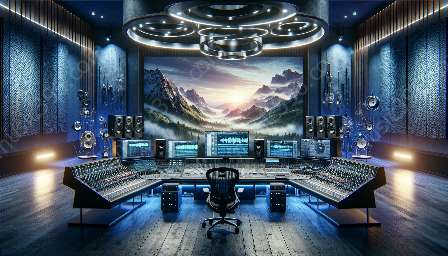In recent years, machine learning techniques have significantly impacted the field of multichannel audio signal processing. This emerging area of research has seen a growing number of applications spanning from audio analysis and synthesis to spatial audio processing and source separation. In this comprehensive guide, we will delve into the various aspects of machine learning in multichannel audio processing, exploring the latest developments and their compatibility with audio signal processing.
Understanding Multichannel Audio Processing
Multichannel audio processing involves the manipulation and analysis of audio signals that are distributed across multiple channels or audio sources. This allows for the creation of immersive audio experiences, spatial sound reproduction, and improved audio quality. Traditional multichannel audio processing techniques revolve around signal enhancement, source separation, and sound localization to optimize the listening experience.
The Role of Machine Learning in Multichannel Audio Processing
Machine learning has emerged as a powerful tool for addressing the challenges in multichannel audio signal processing. By leveraging the capabilities of machine learning algorithms, researchers and engineers can enhance the analysis, manipulation, and synthesis of multichannel audio signals. The following are some key areas where machine learning has made significant contributions to multichannel audio processing:
- Source Separation: Machine learning techniques enable the effective separation of audio sources in multichannel recordings, allowing for the extraction of individual sound sources from complex audio mixtures.
- Spatial Audio Processing: Machine learning algorithms can improve spatial audio processing by accurately localizing sound sources in multichannel setups, creating realistic audio environments.
- Content Analysis: Machine learning facilitates the automatic analysis and categorization of audio content in multichannel recordings, enabling efficient indexing and retrieval of audio data.
- Synthetic Audio Generation: Machine learning models can be trained to generate synthetic multichannel audio signals, opening up possibilities for creating new and personalized auditory experiences.
- Speech Enhancement and Recognition: Machine learning-based algorithms can enhance speech quality and enable robust speech recognition in multichannel audio recordings, improving communication systems and voice-controlled applications.
Compatibility with Audio Signal Processing
Machine learning techniques in multichannel audio processing are highly compatible with traditional audio signal processing methods. By integrating machine learning algorithms with audio signal processing techniques, researchers and engineers can achieve advanced audio analysis and synthesis capabilities. The combination of machine learning and audio signal processing allows for the development of innovative solutions such as intelligent audio filters, adaptive equalization, and personalized audio enhancement techniques.
Challenges and Future Directions
While machine learning holds great promise for multichannel audio processing, it also presents various challenges such as data scarcity, model interpretability, and real-time processing requirements. Overcoming these challenges requires interdisciplinary collaborations and advancements in algorithmic development. The future of machine learning in multichannel audio processing looks promising, with ongoing research focusing on improving model robustness, scalability, and applicability in real-world audio processing systems.
Conclusion
Machine learning has revolutionized the field of multichannel audio processing, offering new avenues for enhancing audio signal processing and creating engaging audio experiences. As the integration of machine learning techniques continues to advance, we can expect to witness groundbreaking developments in multichannel audio analysis, synthesis, and manipulation, further propelling the evolution of audio technology and its applications across various domains.


